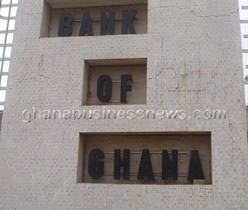 Financial analyst Sydney Casely Hayford has accused the Bank of Ghana (BoG) of lying to Ghanaians that it is injecting $20 million daily into the money market to stabilize the cedi.
Financial analyst Sydney Casely Hayford has accused the Bank of Ghana (BoG) of lying to Ghanaians that it is injecting $20 million daily into the money market to stabilize the cedi.
The cedi has fallen more than 20% in value to the major trading currencies between January and June 2015.
The Bank of Ghana (BoG) has explained that the move is to scale up dollar sales on the interbank market from $14 million a week in a renewed attempt to stabilize the cedi, which has shed more than 20% in value against the dollar in recent times.
The Governor of Bank of Ghana, Paul Kofi Wampah has stated that “we expect the cedi to stabilize by the end of the first half of the year when we have some major offshore inflows.”
But Sidney Casely Hayford speaking on The Big Issue on Saturday, downplayed the move saying “they [BoG] are lying to us, they can’t afford $20 million a day.” The financial analyst argued that if the BoG can make $600 million in a month, then going for the bailout package from the International Monetary Fund (IMF) was not necessary.
“If you have $600 million, why are we going to take $918 million from the IMF? It’s not possible.
The Bank of Ghana cannot make $600 million in a month.”
Per his estimation, “$20 million a day will translate to about $600 million in a month. Where is the money coming from? This is where the whole problem starts. They can’t even find $45 million to pay for the Bankswitch case. If you had $20 million to sink why would you not lend government $45 million to pay for the Bankswitch case and avoid the so called GH¢1 billion debt that we are hearing it’s supposed to come.”
Cocoa syndicated loan
He said if government intends to use the money from the cocoa syndicated loan to finance the move, then it has failed.
“The cocoa crop has failed. We have already borrowed $1.7 billion in order to deliver 870, 000 metric tonnes. Now our crop is short but we still have the 1.7 billion so we are definitely not going to be able to pay back the loan we have taken for the cocoa support money. So we have to either return some of the money or we promise against future crop that we will make up the difference and move on.”
“If the cocoa market has confidence in us that we can deliver the shortfall plus more next year, they will go ahead and still issue a bond of that size.”
It will empower more speculators
Casely Hayford argued that announcing the $20 million initiative will pave way for speculators to again take advantage of the currency in the near future.
“… If the speculator knows that you are going to be putting money into the system then he is prepared. He is going to buy as much dollars as he can today because he knows that somewhere down the line it will deteriorate a little bit more and he will hold on to it until the crisis is over and you’ve exhausted all your money and then the cedi will start depreciating again.”
Dumsor factor and impact on industries
The financial analyst explained that the current power crisis has also adversely affected the cedi in many ways.
According to him, government spends a lot of money in buying light crude and gas to power and generate electricity for the country.
He added that, the cedi will only improve if the power crisis is resolved.
“… The demand to energy shortage is close to about 800 to a 1000 megawatts. So all you can do is to buy it in. You need to increase the supply. We are increasing the supply in three ways – either by gas powered plant or lite crude or our usual rainfall that we expect so that we can get hydro going. Until such time that you can guarantee full 24 hour supply of energy, you are not going to get people come in and build industries in the country.”





